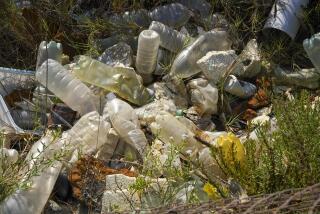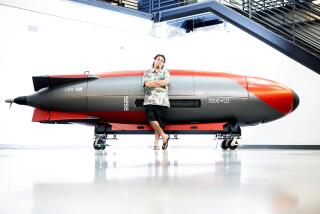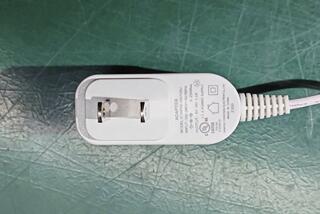Pelican Products proves as durable as the storage cases it makes
The tales of survival almost strain belief.
There’s the off-road endurance race car that rolled down a steep and rocky slope, but the drive team’s gear was undamaged inside their plastic storage cases.
Then there’s the military helicopter brought down by missile fire where, after the pilot and passengers escaped, the only thing salvageable inside was a plastic storage case.
And when an improvised explosive device detonated under an armored vehicle in Pakistan, ripping apart the engine compartment, a U.S. Army combat engineer was able to walk away because of the plastic case that sat beneath his feet.
The incidents are real, recounted on the website of Pelican Products Inc., which made the storage cases. The Torrance manufacturer has built such a durable reputation over 36 years in the military, aerospace, police and rescue arenas that its equipment has appeared in dozens of action films and television shows to add a touch of authenticity.
“We have always been an industrial-grade, professional-grade protective case supplier,” Pelican Chief Executive Lyndon Faulkner said. “It’s in the DNA of all of our products. They are built for very robust environments.”
Pelican has manufactured nearly 1,000 different sizes of crushproof, watertight and dustproof protective cases, most in its 200,000-square-foot factory in Torrance.
Some are as large as a small room and able to carry aerospace parts and oil rig equipment. Others are small enough to provide a snug fit for an iPod Nano.
They are like armored suitcases or footlockers on steroids. Inside is form-fitting foam of varying levels of density, depending on what the case is carrying.
They store almost everything used by the military: weapons, explosives, medical equipment. Pelican cases are used to transport precious artwork and delicate camera equipment. There’s even a Pelican field desk.
The company also makes flashlights used by police and fire departments around the nation. When the Los Angeles Police Department, for example, wanted a new flashlight that was lightweight, bright and rugged, Pelican engineers designed the 7060 LED model, now standard equipment for all LAPD patrol officers.
Lightweight portable lighting systems are part of another product line, able to be swiftly deployed for emergency rescue operations, nighttime bivouacs or a movie or television set.
In 2012, Pelican will introduce 45 new products, many of them cases for personal electronic devices.
Sales are expected to reach $400 million this year, up from $80 million in 2006. One major move: buying the company’s biggest competitor, Hardigg Industries, during the recession, which doubled the company’s size.
Worldwide, the company employs 1,300 people, including 500 in California, and operates five factories; in addition to the Torrance facility, there’s one in South Deerfield, Mass., and small factories in Australia, Britain and Germany.
Pelican has boosted exports to about 35% of sales from about 15% in 2009, in part by opening sales offices overseas, including in China, India, South Korea and Spain. That’s key to the company’s strategy to fight cheap foreign competition, Faulkner said.
“Overseas, we’re out there building that reputation,” Faulkner said. “Nothing sells our products better than our products.”
Pelican Products is a company in demand in many ways. Two years ago, when the lease on the Torrance factory was about to expire, Faulkner said, the company was wooed by officials in six states, most of them in the South. All were hoping to persuade Pelican to relocate.
In the end, the company stayed because management was unwilling to jeopardize its veteran and highly trained workforce.
“We felt we had a loyalty,” Faulkner said. “We have unbelievably low turnover, and we have a lot of knowledge from a lot of people. We think that allows us to be very efficient. To lose all that by moving into a new state, having to rehire, having to train, who knows what else, we felt was a risk we didn’t want to take.”
If Faulkner has a soapbox, this is it. The 51-year-old native of Wales is a huge booster of American manufacturing.
California lost nearly one-third of its manufacturing jobs between 2000 and 2010, falling from 1.84 million to 1.24 million, according to state employment statistics. Faulkner said his company is an example of how to bring more of those jobs back through training, innovation, automation and aggressive product launches.
In Pelican’s Torrance factory, the process starts with plastic beads that are measured and mixed with what Faulkner describes as “the secret sauce” that makes Pelican cases so durable that they are backed by a lifetime warranty. The cases are replaceable on request, no questions asked.
The melted material is poured into molds, one for each size and shape of case, that can be moved in and out of the assembly lines as needed.
Using these preformed tools — Faulkner nicknamed them “the Jell-O molds” — reduces the time needed to break down each mold and set up the next to less than 10 minutes, compared with about 18 hours before.
“That is a huge engineering innovation, all designed here,” Faulkner said. “You can see on the tools all the work that would have had to be done, all of the pipes that would have to be fitted. We have a device that takes the old tool out. The new tool goes in and we’re making a new case, all in less than 10 minutes.”
Once the mold has cooled, a robotic device removes and cuts the mold prior to assembly.
Pelican was founded in 1975 by husband-and-wife team David and Arline Parker, who began it as a home-based mail-order business. David Parker, an avid scuba diver, didn’t like the dive equipment available on the market and decided to make his own.
In 2004, New York private equity investment firm Behrman Capital bought Pelican for about $200 million.
Faulkner was hired to run Pelican in 2006 after a stint with Microsoft Corp., where he worked on development of the Windows Vista operating system and the Xbox game console.
On a shelf in his office is one of the first Xboxes off the assembly line, scrawled with the note: “Great work — Bill Gates.”
Faulkner has gone back to his roots in the way he manages Pelican. The first companies he worked for gave him a kind of apprenticeship and helped fund his higher education, which included a degree in electrical engineering at Gwent College of Higher Education.
Now, Faulkner said, he is proud that he helps younger employees with their training and education. He’s also created an in-house repair crew that maintains all of the factory equipment.
There is one place in the Torrance facility, however, where not much seems to happen, and that makes Faulkner happy. It’s the warranty repair department, where customers send back products that have not met expectations.
“Quiet here,” Faulkner said. “Best job in the company.”
More to Read
Inside the business of entertainment
The Wide Shot brings you news, analysis and insights on everything from streaming wars to production — and what it all means for the future.
You may occasionally receive promotional content from the Los Angeles Times.











